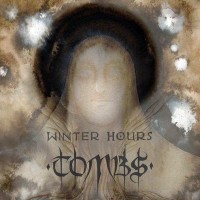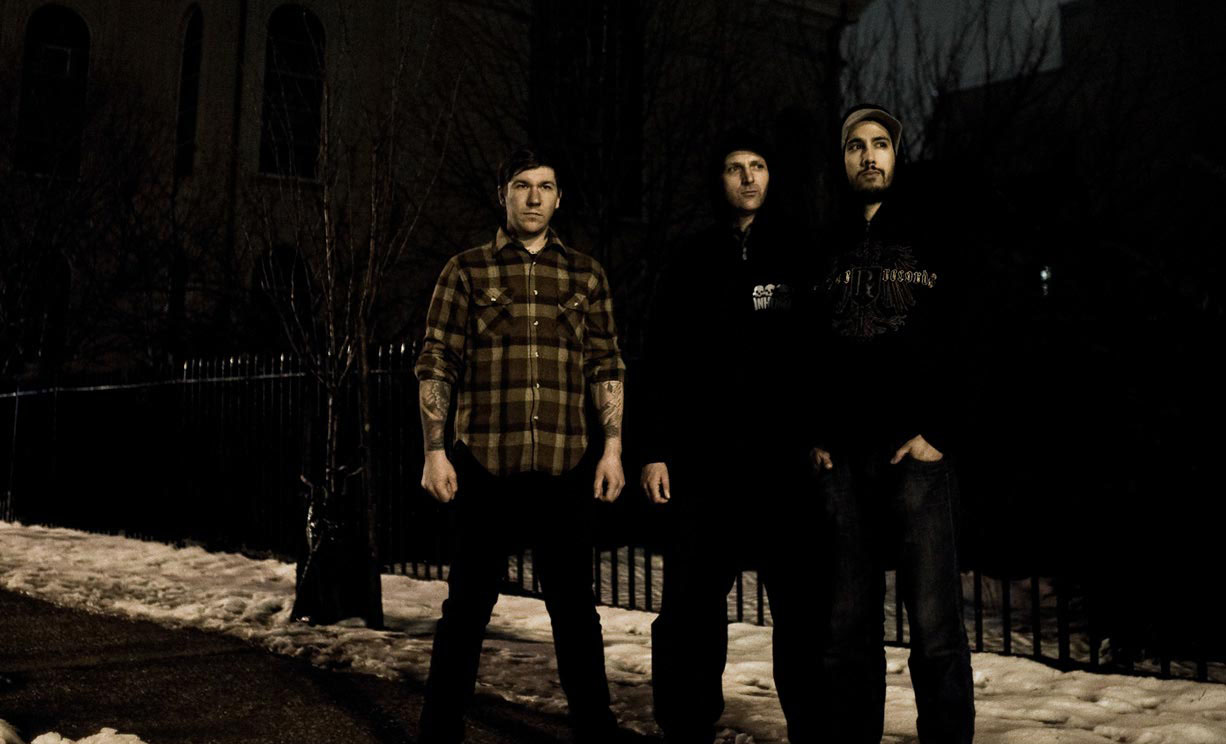 Tombs: Winter Hours (Relapse, 2/17/09)
Tombs: Winter Hours (Relapse, 2/17/09)
Tombs: “Gossamer”
[audio:https://alarm-magazine.com/wp-content/uploads/2011/04/01-Gossamer.mp3|titles=Tombs: “Gossamer”]“It’s about control and discipline,” Tombs frontman/guitarist Mike Hill says. The Brooklyn metal three-piece and I are sitting at a picnic table outside Waterloo Records during the South by Southwest Music Conference in Austin, Texas. Hill’s words particularly stand out against the carefree atmosphere of the five-day, live-music festival. Outside a business conference and trade show at the Austin Convention Center, SXSW can easily resemble an independent-music Mardi Gras, with many concertgoers drinking waterfalls of Texas’ Lonestar Beer, seeing as many shows as physics allows, and generally partying their hearts out around the clock.
Tombs is on its first tour since the release of its debut full-length, Winter Hours. The album is a haunting hybrid of metal and hardcore, covered with thick coatings of noise and pristine melody. At Waterloo, the band completed its third set in roughly 24 hours after an overnight drive from Little Rock, Arkansas. Despite the demanding schedule, its members show no sign of fatigue; their commitment to discipline and control has paid off.
“To do what we’re doing at the level we want to be doing it at, you have to have a certain amount of dedication and a certain amount of professionalism and discipline,” Hill says. “There is a very narrow margin of personal conduct that is acceptable.”
He goes on, “I’m talking about being able to go as hard as you can, to know that you’ve really brought something to the table. There is no connotation of financial success or anything other than a level of personal achievement.” Hill is pleasant and conversational, but there is a serious undertone to everything he says, like a revered sensei in a ninja film waxing philosophy to his disciples. “In this substrata of marginal music, it’s easy to get covered over by other people unless you have your act together.”
When it comes to the dos and don’ts of playing in an independent band, Hill certainly knows what he is talking about. Starting in Boston in the early 1990s, he has been a staple in the underground hardcore community, playing in a number of bands and fronting hardcore powerhouse Anodyne for the better part of a decade (1997–2005) before starting the esoteric Versomna. An accomplished producer as well as a musician, Hill has recorded albums by heavy bands such as Isis, Lickgoldensky, and Piebald, and he owns his own label, Black Box Recordings.
Hill started Tombs in 2007. Bassist Carson Daniel James joined a few months later, after original bassist Dominic Seita amicably parted to develop NYC doom quartet A Storm of Light. The trio released a self-titled EP on Black Box / Level Plane before signing to Relapse Records, and drummer Andrew Hernandez joined just after the sessions for Winter Hours were complete, learning the band’s entire set in just nine days prior to a European tour.
Like Hill, James and Hernandez are both rooted in the DIY punk community. Hernandez relays humorous tales of his formative years as a 14-year-old concert promoter from a small town in Massachusetts. He would find bands’ phone numbers on seven-inch records and randomly call them to ask them to play a show or for a place to crash after taking a one-way bus trip to concerts in their cities.
“I’m talking about being able to go as hard as you can, to know that you’ve really brought something to the table. There is no connotation of financial success or anything other than a level of personal achievement.”
“I figured that I’d either find a place to stay or I’d sleep on some steps,” Hernandez recalls. “I was at the show; that was all that mattered.” Two of his most successful calls, as it turns out, were to future band-mate Hill during his Anodyne years and to his future label manager, Relapse’s Gordon Conrad.
Hill’s sentiment towards control is echoed by his band-mates. “We like a certain amount of self-sacrifice,” Hernandez says. Although they are far from monks, the members of Tombs take pride in staunch dedication to their craft and their willingness to push themselves to the limit with their music. They maintain a rigorous practice schedule, whether writing new material or preparing for a tour.
“It’s learning how to react without thinking,” James explains. “It’s doing what seems obvious, rather than fumbling.” Hill agrees. “In a live setting, anything can happen,” he says. “It’s like when you’re on a special recon mission for military operations: you rely on your training to get you through everything. We rely on practice to get us through the rough spots. Personally, I am using more effects and technology with this band than I have in the past. With that component, a lot of things can go wrong.”
Winter Hours was recorded by Ian Whalen and John Chambers at Etching Tin Studios in Richmond, Virginia. With the financial support afforded by the new label, Hill was able to step away from the control room for the first time in order to concentrate on his songs. “I still wanted to have production influence,” he says, “but as far as engineering goes, it was more important for me to focus on execution of parts and performances.”
Most of Tombs’ songs are developed out of Hill’s ideas, with the other members writing their parts during rehearsals. James observes that, because of the limitations of practicing as a three-piece, the other members often learn about the atmospheric effects that Hill has planned for each track only once the recording process has begun. For his part, Hill says that every sound on the record is deliberate. Nothing is left to chance.
“I spend a lot of my time planning it all out so that when we get to the studio, it’s strictly execution,” he says. “I know a lot of it sounds experimental, but there is really none of that stuff going on.” The overall effect, best articulated on opening number “Gossamer” and “The Divide,” is much like a heavier take on the “Wall of Sound” developed by Phil Spector, a producer whose studio work Hill especially admires.
Lyrically, much of Winter Hours was inspired by a series of nightmares Hill had about the Apocalypse, which, in hindsight, he relates to his dissatisfaction with the Bush administration (though his penchant for reading about conspiracy theories couldn’t have helped much).
“It was kind of subconscious,” he says. “It was bubbling to the surface for a year. Now that I have a little distance, I feel like a lot of it was the Republican presence and George W. Bush. I feel optimistic now that he is out of the office. There was a certain powerlessness and vulnerability that came from that time. Filtering other emotions through that resulted in the bulk of the lyrics on that record. They’re personal ruminations filtered through political observations.”
Though the presidential office has since changed hands, Tombs doesn’t see the mood of its music changing. “There’s always a dark cloud,” James notes. Hill explains, “The music itself is just intensity. There are bands like Michael Gira from Swans who play acoustic music, but it is still the most intense music there is.”
With Winter Hours still fresh on the shelves, Tombs is already working new material, and it has become evident that though the atmosphere may stay the same, the music will differ from anything that the band has done before. “The changing of our drummer will, without a question, propel our music in a new direction, whether we consciously go there or not, which is good,” James says. “It’s a constant flux, without having to be pigeonholed into one thing.”
Tombs is open to new sounds in its music, so long as the inspiration comes from within the band, rather than following trends. “If [a change in sound] is true and you alienate someone, at least you’re keeping yourself happy,” Hill says. Yet in the members’ quest for their own satisfaction, they’ve neglected to realize that they are making music that outsiders can enjoy as well.
The members of Tombs are genuinely surprised at the positive reception that they’ve received from fans, explaining that they have no expectations of others. “It’s one of the main things I apply to most of the aspects of my life,” Hill says. “If you don’t expect anything, that gives you a certain level of freedom.”
Tombs holds itself to different standards altogether. “There is a division, really,” Hill adds. “I demand an incredible amount from myself, but it is all personal achievement. Do I expect anyone to acknowledge what I do? I would say no. When I go out of this world, I want to know that I did my best. I want to go out knowing that I did what I could, regardless if anyone cares. If people want to acknowledge it, that’s great. But I don’t expect that from anybody.”
Still, people are increasingly paying attention, and in its short time as a band, Tombs has found fans in underground metal and punk circles as well as new listeners in some unlikely places. James recalls a recent show in San Antonio opening for British electronic producer Tricky where a new fan approached the group and mused, “You are up there just doing your thing. It doesn’t seem like you’re writing for anyone but yourselves.”
James pauses before remarking, “I guess what it comes down to is that we’re still three guys in a practice space who are friends and live in the same area, playing music that we want to play without thinking outwardly about what other people want to hear.”

